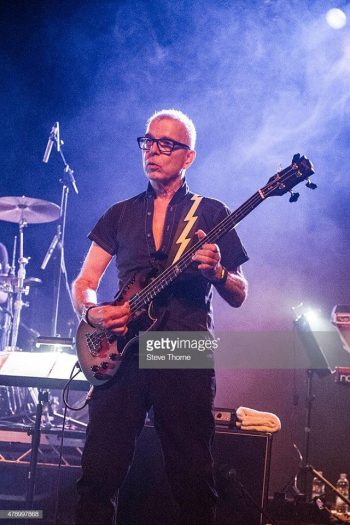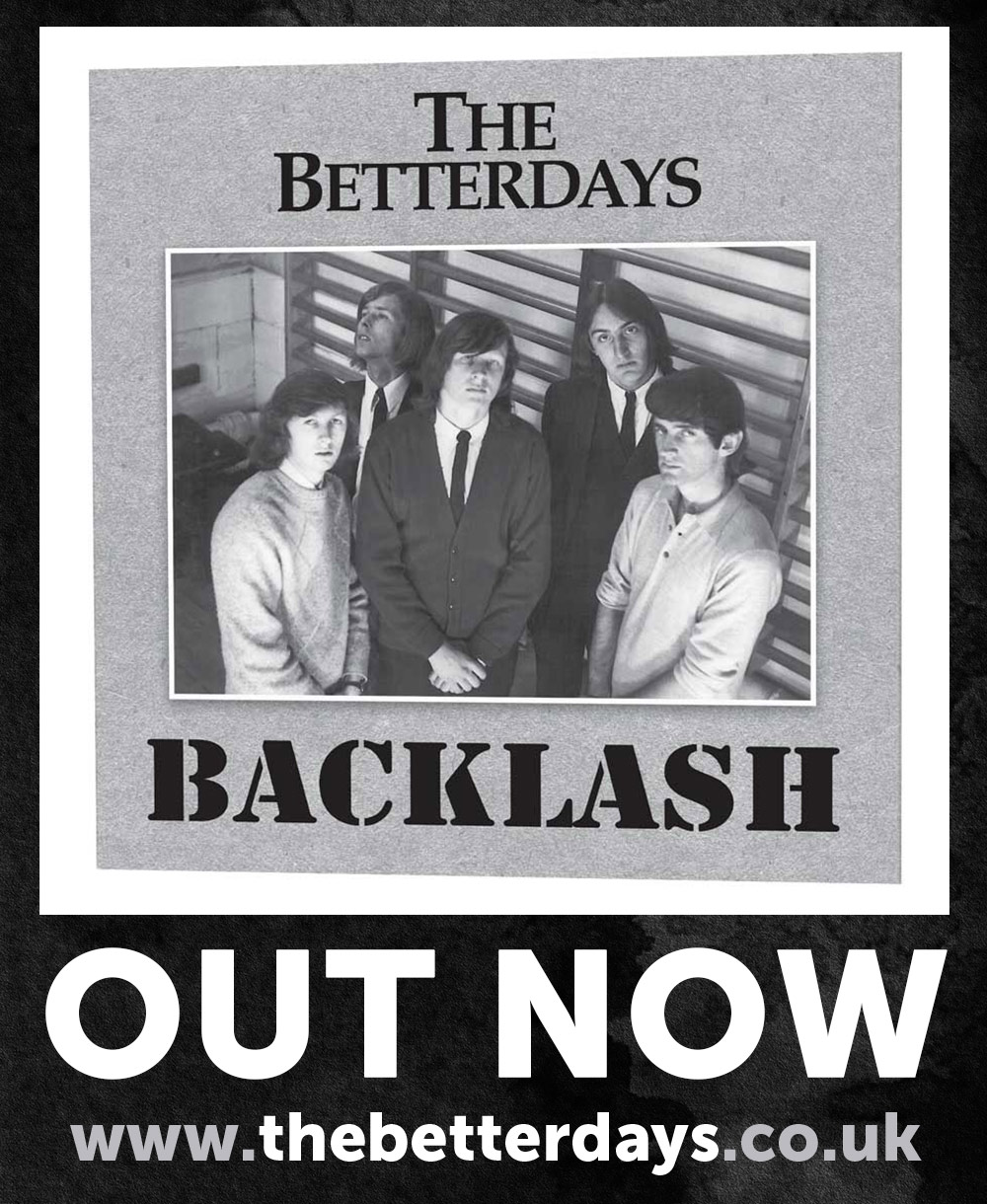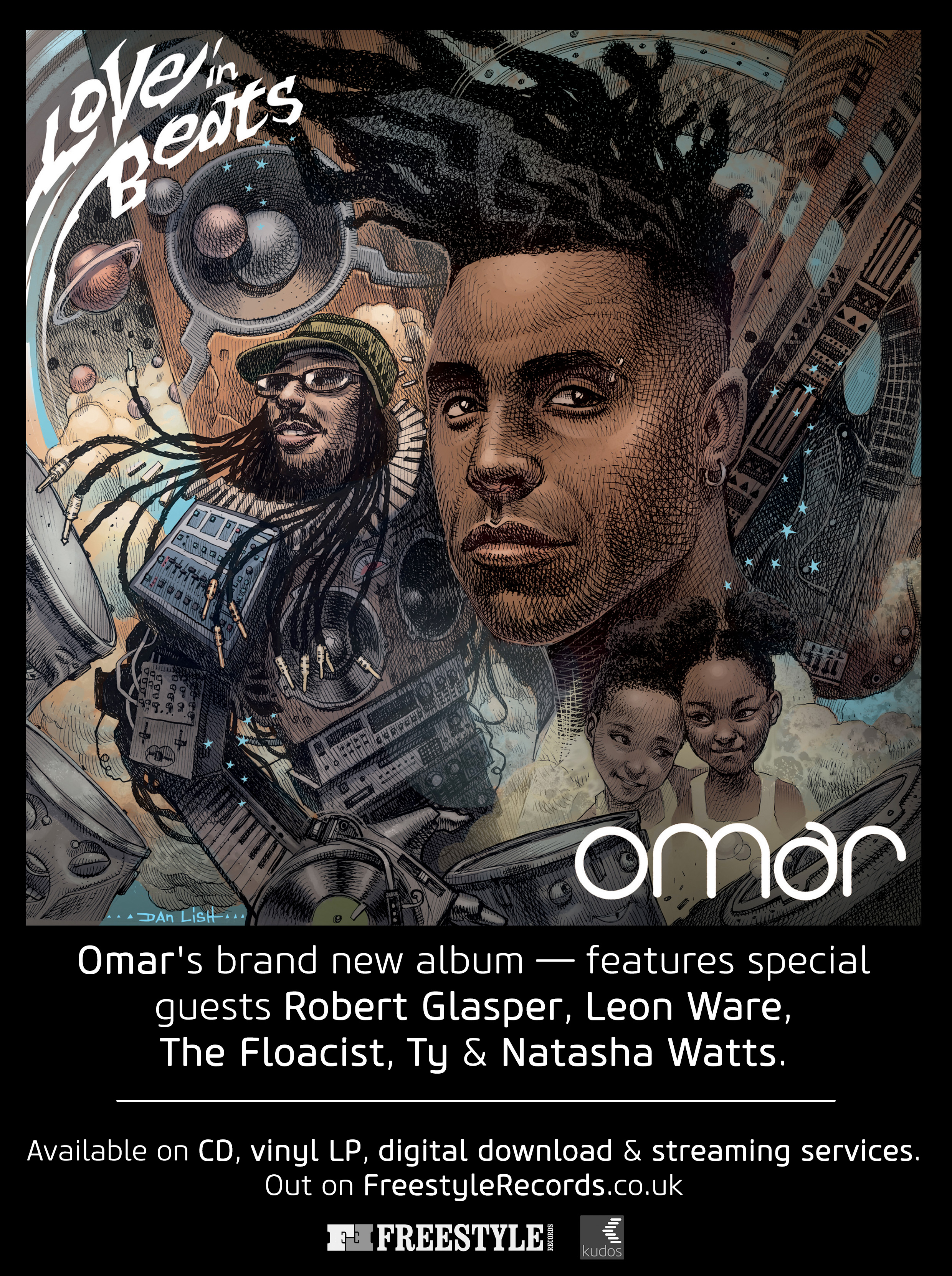Last night (8th Feb 2019) in York was the first of 13 UK tour dates for Holy Holy – the starry Supergroup paying homage to late rock God David Bowie.
Led by legendary producer Tony Visconti and Ziggy Stardust drummer Woody Woodmansey.
Lucy Boulter talked to Tony Visconti in a rare and emotional chat about his five-decade friendship and collaboration with Bowie; opening up about the last hours spent with David before his death, and lots more…
It’s easy, as a Bowie fan, to describe the feeling of loss since Bowie’s death. But we have to remember it is a detached grief.
For Tony Visconti it is different: he has lost a 50-year personal and professional relationship. He and Bowie were flatmates and friends, collaborators and colleagues.
As a musician and as a producer, Visconti helped to create Bowie’s sound. He was there for Bowie’s self-titled second album in 1969, and he was still there for his last – “Blackstar”, released just two days before his death in 2016.
He was part of Bowie’s transformation from folk singer to space alien, to plastic soul singer, to arena-filling rock star, to avant-garde icon. He produced thirteen albums with Bowie, including the celebrated Berlin trilogy of “Low”, “Heroes” and “Lodger”.
Spotted by Bowie from a window in Hansa Studios, stealing a kiss with someone by the Berlin Wall, he was even the inspiration for one of his most famous lyrics: “I can remember, standing by the wall, while the guards shot above our heads, and we kissed, as though nothing could fall” – (“Heroes”).
Grief
Visconti’s grief is subtle but apparent throughout our conversation. Several times he speaks of Bowie in the present tense. Only sometimes does he remember to correct himself. Ironically, perhaps, Visconti was on tour with Holy Holy in Toronto, when news broke of Bowie’s death.
“My friends in London started to text me at 2am, and it didn’t take me completely by surprise. But I was struck with absolute grief,” he tells me. “Oddly enough, I just turned my ringer off and I went back to sleep. It was the only way I could deal with it. It was too much to bear.
“Someone knocked on my door at about 8am; it was Woody, and he’d just found out. We had a band meeting later to see if we actually continued playing or not. We really only had one or two more shows left. It wasn’t easy to take.”
Visconti was one of a very small handful of people who knew Bowie was ill. He recalls the day David told him: “That was pretty awful. I cried my eyes out. That’s when I did actually burst into tears! I was shocked. You know, I’m older than him – I expected him to outlive me.”
I wonder out loud if working on”‘Blackstar” had provided any kind of therapy or impetus for Bowie in that last year, rather as their old friend and colleague Mick Ronson had found in his final album ‘Heaven and Hull’, released after Ronson’s death in 1993.
“Well, no, actually, because he had another album planned right after this, right after ‘Blackstar’. You know, maybe he was gambling, but he was certainly optimistic. There was no desperation. In fact, he was in one of the best moods I’ve ever seen him in.”
This begins to address a heartache I’ve felt since I saw the ‘Lazarus’ video for the first time after Bowie’s death. In this altered context, I was struck by a scene in which Bowie is writing, faster and faster, scribbling furiously and running out of paper.
Was this, in hindsight, a metaphor? Did Bowie know he was running out of time, but felt he had so much more to say? “Well, I don’t know,” muses Visconti. “He didn’t expect to die. He was going to fight the cancer, and he was very optimistic actually. But he is very smart – he was a very smart person. It was symbolic. I never really spoke to him about why he did that, but I can read the symbolism.”
New Bowie material
So what about the new album Bowie was planning? Is there hope for us that there may be new material ahead? “I spoke to him at Christmas, and he was very excited that he had five songs – though what he calls a song is just a song idea. I could hear the enthusiasm in his voice. I truly believed him. After the holiday break, I was really looking forward to going back into the studio with him.
“Usually Bowie wrote at the very last minute. Had we gone into the studio, he would just spring into action – and when he’s put under pressure, he does his best work. There’s kind of a shutdown in the Bowie camp, and I’m not privy to anything going on unless they specifically want me to do something, like remix an older album. Knowing the way that he worked in the past, I don’t think anything is really finished. So I think they were just ideas. There’s been nothing to work on.
“But Bowie is loyal to his fans. He definitely made provisions for re-releases after his death. If something’s going to be re-released, he liked the original producer to have a shot at it. He’s given orders that certain people have carried out since he died. Loyalty to the fans always was important to him. He really had his heart in the right place.”
Tony Visconti won two Grammy Awards the year after Bowie died, for his work on the ‘Blackstar’ album (‘Best Alternative Music Album’ and ‘Best Engineered Album’). I suggest to him that these awards must have felt bittersweet. “Yes, they were – but I’m glad he’d won a Grammy.” (In the same year, Bowie was posthumously awarded ‘Best Rock Performance’ and ‘Best Rock Song’ for the album’s eponymous track.)
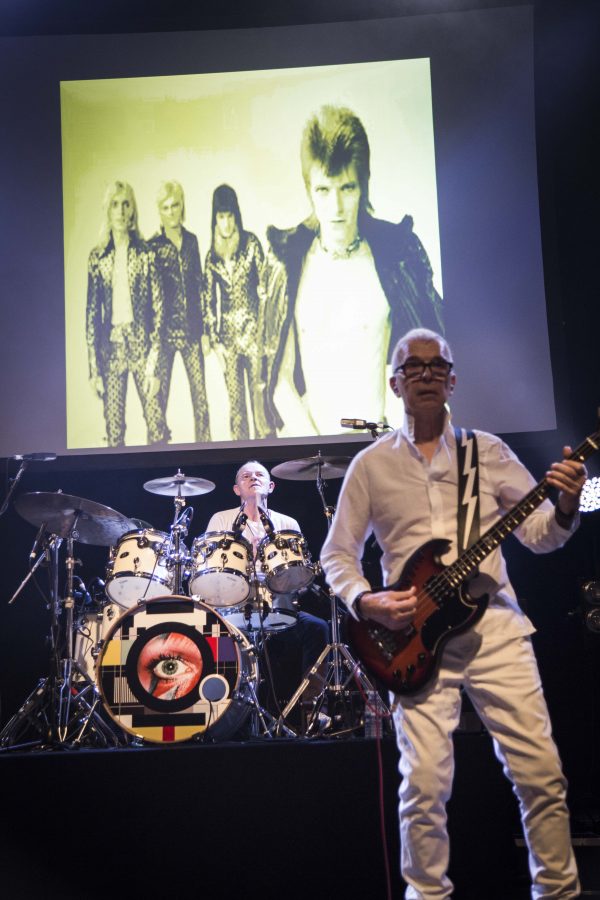
Visconti says he feels that David Bowie had been ignored by The Recording Academy, formerly NARAS (National Academy of Recording Arts and Sciences) for years, because he was rather left-field. Indeed, Bowie had not won a Grammy since 1985, for his short film accompanying the ‘Blue Jean’ single, although he was given a ‘Lifetime Achievement’ Award in 2006.
Anti-hero
“Bowie wasn’t mainstream, and the Grammy’s are all about mainstream. He was such an icon, an anti-hero kind of person. He wouldn’t collaborate or play the game. He’s well-known for doing that, he turned down loads of awards.” Perhaps the ultimate anti-hero was Ziggy himself. I note that when Visconti first worked with him, Bowie was rooted in a folk style of music and trained in mime and movement.
In fact, in his book, “Bowie, Bolan and the Brooklyn Boy”, Tony Visconti describes Bowie’s career at that time as “nebulous”. Bowie made a fast and radical shift into his Ziggy persona, integrating his musical genius and his mime and dance experience learned with friend and mentor Lindsay Kemp.
I wonder how difficult it must have been for anyone in his close circle to process that shift. “The cleverest thing he ever did, and cleverer than any other pop star, he actually created a persona. That’s pretty unusual. I mean, you’ve got to give him five stars out of five for that idea – it was brilliant.
“I was working full-time as a producer with Marc Bolan and others at that time, but whenever I saw David, he was in character all the time. He took on a different accent, his body jerked differently; he was really a different person. Incredible. That was the first time he realised who he was, because he’d been waffling around since he was a teenager. He tried everything, in all kinds of groups, with all kinds of people.
“He played the baritone sax and wanted to be a saxophonist, but that didn’t pan out because he had to study hard! He just wanted to do things, to jump from this to that. He was very mercurial.
“ ‘Hunky Dory’ was beautiful. I had nothing to do with that, but I did do the previous album, ‘The Man Who Sold The World’, which was virtually the blueprint for Ziggy Stardust. I still feel if there were no TMWSTW, there’d be no Ziggy Stardust. He’s been so many people and done so many different things, but right at the beginning he had a really good core, a base – Mick, Woody, me.”
Returning to the career description “nebulous”, I ask Tony what single word he would use to describe Bowie’s career now, retrospectively and 50 years on. Admittedly, I don’t really expect a single adjective.
“I don’t know in one word – but he finally understood who he was and what he was capable of doing. He came up through an age when people were marginalised and put in a box. If you did this, you couldn’t do that. Or if you did that, you couldn’t do this. And you know, we all know now, he had so many things he could do very well.
“And it took him about half his life to realise some of them. By the end of his life he had written his play; he’d always had a musical in mind. [‘Lazarus’, which opened on Broadway just weeks before Bowie’s death.] He was a film actor; I loved his portrayal of Tesla. I told him: you should do a biopic on him! He was terrific as Tesla.
David Bowie the super-human…
“I don’t know how to sum him up in one word. He’s just super-human. He had like ten careers in his life.” Visconti’s career has been pretty stellar too. His discography reads like a Who’s Who of the global music industry, working with greats such as T-Rex, Iggy Pop, Thin Lizzy, The Moody Blues, U2, Morrissey and many more.
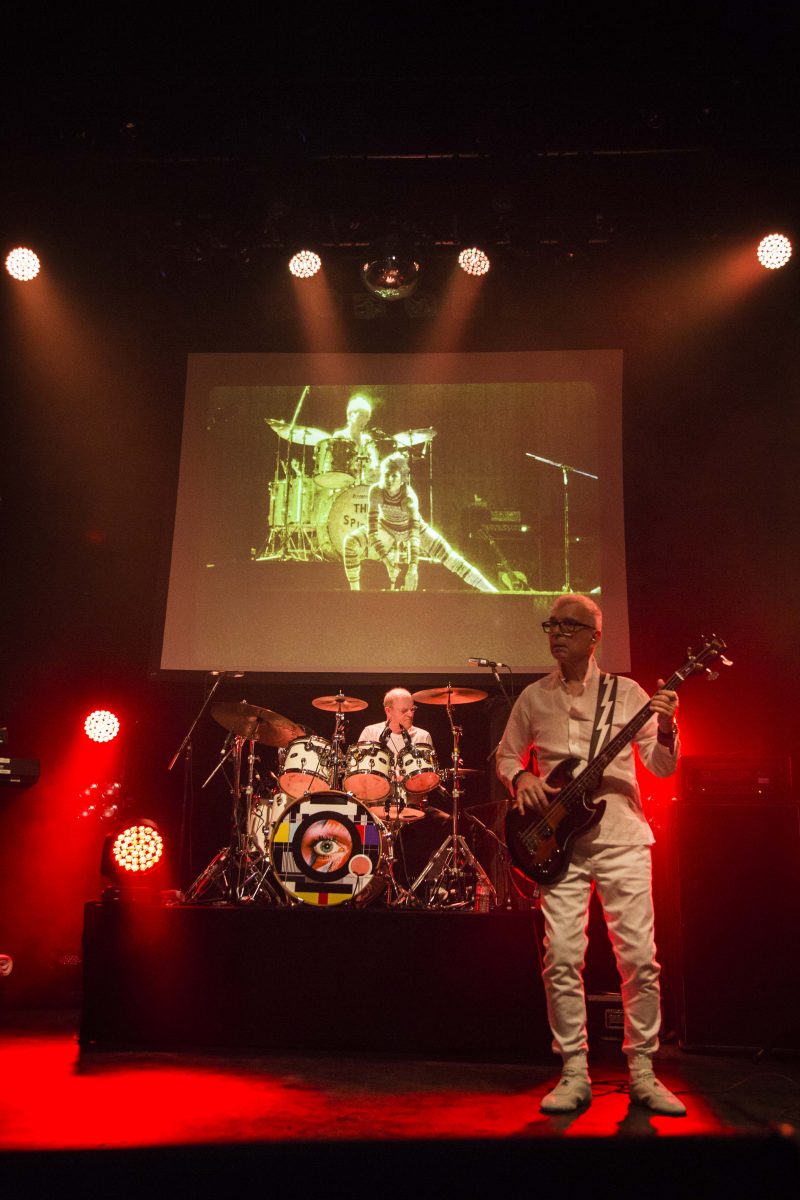
Within little more than a decade in the studio, Visconti’s reputation alone was a driver for a rising star’s career choices – although he may not have realised it at the time. Speaking at an audience Q&A just before Christmas, singer Hazel O’Connor told us she didn’t really see herself as an actress, and that she only went for the seminal ‘Breaking Glass’ role because she just wanted the chance to have Tony Visconti produce her records.
I relate this compliment to Visconti; he sounds rightly pleased, and recalls the dynamic energy involved with the film: “We got on great. I was excited to work with her, too. She was doing something really different. She had a handful of songs that got her the job, but half the songs were written the night before they shot a scene.
“I had my studio on standby, and a group of musicians, and we’d go in and record furiously through the night. That girl barely slept – you know, she was on the set at 8am. Such an exciting time for her, and for me too – it really was, working on a film, and at that speed too. I like that kind of work.”
Such an appetite for working fast and prolifically has stood Visconti in good stead over the years. A great example of this was being commissioned to write the string arrangements for a 60-piece orchestra – for the classic Paul McCartney and Wings album “Band On The Run” – in three days flat.
I wanted to be the fifth Beatle!
Some people might have found this daunting, but not Visconti. It may have helped, of course, that The Beatles had been his own musical influence as a keen teenage guitarist. Indeed, the subject of a musical fantasy, as he explains:
“Like a lot of young Americans at the time, I fell in love with The Beatles – to the point where I had a fantasy that if they had met me, I would be the fifth Beatle and I could actually join the group!
“But then, my eyes shifted slightly to the left and I saw this wonderful genius called George Martin. And I knew, as rock n roll as The Beatles could do, what he did for them…you know, he did the string-writing, the grander picture…
“They became masters on their own, and Paul McCartney is still doing amazing things. But it was George Martin. Without George Martin, what kind of Beatles would there have been? It’s an interesting question.
“I said to myself: I have to get to London somehow. At that point, I was a Brooklyn kid and no one from Brooklyn ever went to London, to my knowledge! I had such strong intent. Seven years later I was working with great British artists like Joe Cocker, Marc Bolan, David Bowie…and all in their infancy as well. That was the best time to be in this country.”

With a gold-plated discography, a contacts’ book most people would die for, and in constant demand as a producer , I wonder why he would want to go out on the road for this Holy Holy tour.
“Well, because my band is fantastic! I love the band – including my own daughter, Jessica Lee Morgan, who is a phenomenal musician and singer. And Glenn Gregory is just one of the best singers I’ve ever worked with. I knew him before the Holy Holy tours – I worked with him on a project and I just never forgot him. His was the only name I put forward [for a singer]. And the two guitarists, Paul Cuddeford and James Stevenson, are Mick Ronson experts. I mean, if Mick were alive, his jaw would drop – how well they know his work and his style.
“It’s just a good feeling to be on stage, and to lock in with Woody. The bass and drums always have a special relationship. We lock in and the whole band just surrounds us with beautiful, beautiful music. And these songs are probably the best songs you could play live – very rich and harmonic. It’s challenging and fun to play.
NOT a tribute band
“We do have plans to put additional material in on future tours, because the criterion is that Woody and I have to have worked on it. This gives us permission to NOT call it a tribute band. We can draw from anything I produced – and we might even take a song or two from ‘Blackstar’ in the future.”
I allow myself a moment of mischief and ask Tony if we will see ‘Hype Man’ make an appearance on this tour. A reference to The Hype, Bowie’s band preceding The Spiders From Mars, in which Visconti and Ronson both starred.
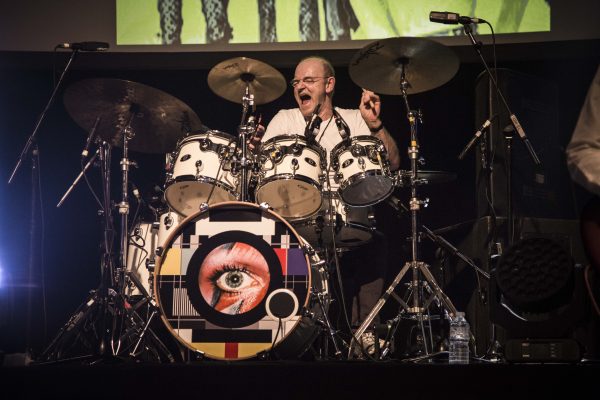
At a time when the rockers’ dress code was lumberjack shirts and torn jeans, according to Visconti, the band introduced what felt like “the very first night of Glam Rock”, in silver crochet, leotards and gold lame. Visconti wore an H on his leotard and was known as ‘Hype Man’.
He laughs; but takes the trouble to make it very clear that ‘Hype Man’ will not make an appearance on this tour: “We don’t want to distract from the music! I think if I put that outfit on now, it would be very comedic.”
So, with a great band, and future tours to plan, what does Tony Visconti most hope for from this tour? “That I’ll be alive at the end of it!” he laughs. “It really takes a lot out of me. I’m almost 75-years-old. I don’t drink or smoke, I’m very fit – but you know, it’s not easy.” Life on the road or long hours in the studio, must surely depend on being fit.
Visconti credits Tai Chi for his recovery from a crazy lifestyle all those decades ago, in which he describes “the twin pillars of rock ‘n’ roll camaraderie – Cognac and cocaine”. He’s also a qualified teacher of the Alexander technique, giving him essential back health for hours on stage. But it’s almost a shock to be reminded of his age, as he remains at the heart of contemporary music as much as ever.
Recent production credits include bands such as Manic Street Preachers and Kaiser Chiefs, and he recently finished working on an album with Damon Albarn; an experience Tony describes as “one of the highlights of the decade for me – a wonderful person to work with”.
He also continues to influence the next generation of music producers, through the Visconti Studio at Kingston University in Surrey – a research and teaching project created in partnership with the British Library and the Science Museum.
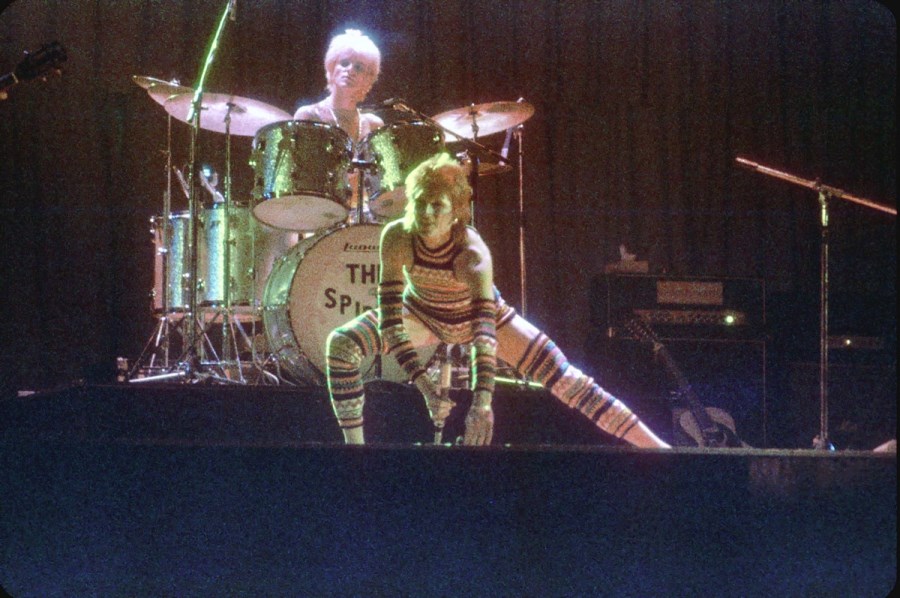
“I always love coming back to the UK, because this is my second home,” New York-based Visconti reminds me. “I spent 22 years of my life here. I speak the language. Not with the accent, but I speak the language!”
Worshipped…
As we wrap up our conversation over the ‘phone, with Tony sat in his London hotel room the day before the UK tour kicked off – mindful that at the heart of everything we’ve discussed is a continuing grief and nostalgia for David Bowie – I ask how we fans can best honour David Bowie’s memory and legacy.
“You’re all doing a fine job. He’s just worshipped, it’s like no other artist. People value him for so many different reasons. He’s not a straight-up performer; he just appeals to film fans, music fans, intellectual fans…he’s covered so much ground. People will know who David Bowie is a hundred and fifty years from now.”
Finally, I can’t help but note Tony Visconti’s energy and passion for it all. Already looking forward to the six months of production work booked in after this tour. “Well, I do feel like the guy who came here in 1967. I’m just full of enthusiasm. I want to break new ground, and I want to learn more about music. That’s how I’ve set up my life. And it kind of keeps me young at heart, you know, young in my mind.”
Curious, energetic, determined to cover as much ground as possible in life….well, Tony Visconti just reminds me of his old friend, David Bowie.
- Holy Holy’s 13-date UK tour closes in Cambridge on 24th Feb 2019. Remaining tickets on sale at: eventbrite.co.uk or www.holyholy.co.uk
By Lucy Boulter
Photos: Getty, Steve Thorne, Dan Woodmansey and PR-supplied
Music Republic Magazine’s recent interview with Woody Woodmansey can be found here: http://www.musicrepublicmagazine.com/2018/06/david-bowie-baked-beans-toast-woody/



